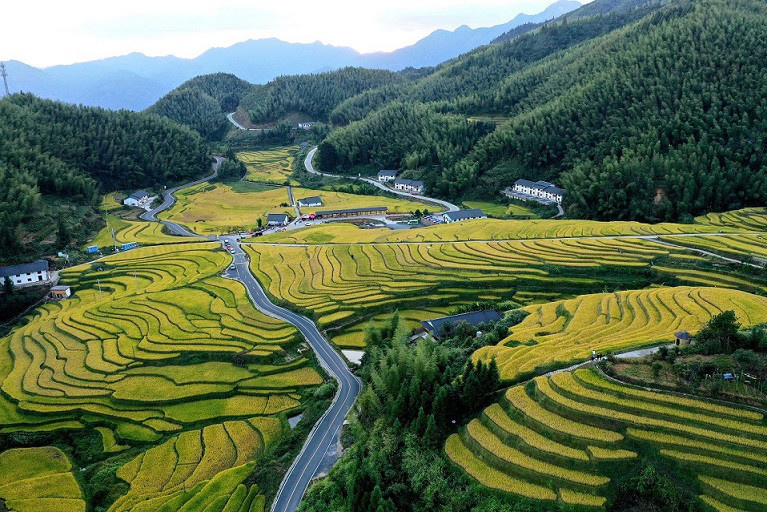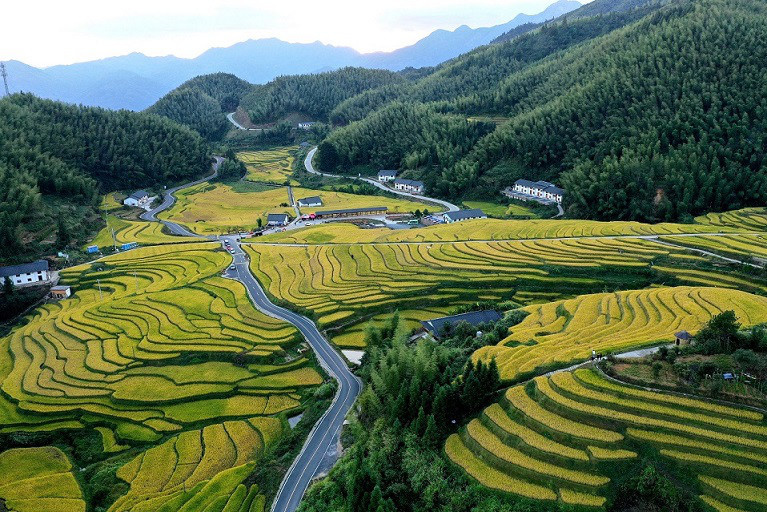By Zhu Lei, People's Daily

Rice matures in the Shangbao Terraces in Chongyi county, Ganzhou, east China's Jiangxi province, October 2022. (Photo by Shi Yu/People's Daily Online)
The Shangbao Terraces in Chongyi, east China's Jiangxi province, whose development traces back to over 2,200 years, were recently included on the World Heritage Irrigation Structures (WHIS) List.
It is the second world heritage title claimed by the site after it was inscribed by the Food and Agriculture Organization of the United Nations as a Globally Important Agricultural Heritage System.
The Shangbao Terraces mirror how local farmers respect and conform to nature. On the top of it, there are luxuriant trees that help conserve water resources. Creeks flowing down the hills provide a natural irrigation system. Terrace steps along the slopes help preserve soil and water. The complete irrigation and drainage system forms a virtuous cycle in which the hills, water resources, farmland, and soil nurture each other.
The Shangbao Terraces are located in the Zhuguang Mountains in the southern section of Luoxiao Mountains. The core section of the terraces is in Shangbao township.
Zhu Yuanjin, deputy mayor of Shangbao township, told People's Daily that the hill where the Shangbao Terraces located is made of granite, which absorbs and holds water, and rainwater retained on the top and slopes of the hills would seep out from the hillside to irrigate crops, just like a natural underground water transmission and drainage system.
"In obedience to the law of nature, our ancestors built a water distribution system on the slopes. Therefore, channels and ditches in the Shangbao Terraces would not dry up even in lasting droughts," said Lu Xinping, head of the water conservancy bureau of Chongyi county.
According to him, the terraces were built with local materials, which were primarily soil, bamboos, and rocks. After constant expansion and renovation, the Shangbao Terraces boast a total coverage of over 3,300 hectares.
The Shangbao Terraces, built on complicated terrain, is an early example of the ecosystem consisting of mountains, rivers, forests, farmlands, lakes, grasslands, and deserts. The terraces come with forests, water, farmland, and villages, thus featuring water conservation, irrigation, water and soil conservation, and crop farming.
Traditional farming has been kept there for generations, which maintains soil fertility. However, in the eyes of Chen Yuyi, general manager of an agricultural company in Ganzhou, Jiangxi province, the Shangbao Terraces can be of higher value.
Chen, who studied biological engineering, said Shangbao township is a perfect place for planting quality rice varieties, explaining that the terraces have an altitude ranging from 500 to 1,000 meters, which helps improve the taste and nutrition of rice. Besides, many terrace steps are surrounded by bamboos, which increase negative oxygen ion content in the air and help prevent insect pests, Chen said.
Chen applies organic fertilizers and uses biological insecticides in the terrace field he contracts. While inheriting traditional farming models, the man also employs modern agricultural technologies. For instance, vibrant barnyard grass in the field is removed artificially, but other grass is kept there to improve the vitality of rice. "Improving the rice's ability to fight diseases and insect pests through the ecological environment is similar to ancient farming wisdom," Chen said.
In Chen's field, there is a rice variety that grows as tall as an adult. “This is a special variety that we have introduced from the national germplasm center, which bears 180 grains on a single ear. It will be our best product," Chen said.
Today, a cluster of ecological tourism destinations centered on the Shangbao Terraces is taking shape, and the terraces are taking on a new look.
It is the second world heritage title claimed by the site after it was inscribed by the Food and Agriculture Organization of the United Nations as a Globally Important Agricultural Heritage System.
The Shangbao Terraces mirror how local farmers respect and conform to nature. On the top of it, there are luxuriant trees that help conserve water resources. Creeks flowing down the hills provide a natural irrigation system. Terrace steps along the slopes help preserve soil and water. The complete irrigation and drainage system forms a virtuous cycle in which the hills, water resources, farmland, and soil nurture each other.
The Shangbao Terraces are located in the Zhuguang Mountains in the southern section of Luoxiao Mountains. The core section of the terraces is in Shangbao township.
Zhu Yuanjin, deputy mayor of Shangbao township, told People's Daily that the hill where the Shangbao Terraces located is made of granite, which absorbs and holds water, and rainwater retained on the top and slopes of the hills would seep out from the hillside to irrigate crops, just like a natural underground water transmission and drainage system.
"In obedience to the law of nature, our ancestors built a water distribution system on the slopes. Therefore, channels and ditches in the Shangbao Terraces would not dry up even in lasting droughts," said Lu Xinping, head of the water conservancy bureau of Chongyi county.
According to him, the terraces were built with local materials, which were primarily soil, bamboos, and rocks. After constant expansion and renovation, the Shangbao Terraces boast a total coverage of over 3,300 hectares.
The Shangbao Terraces, built on complicated terrain, is an early example of the ecosystem consisting of mountains, rivers, forests, farmlands, lakes, grasslands, and deserts. The terraces come with forests, water, farmland, and villages, thus featuring water conservation, irrigation, water and soil conservation, and crop farming.
Traditional farming has been kept there for generations, which maintains soil fertility. However, in the eyes of Chen Yuyi, general manager of an agricultural company in Ganzhou, Jiangxi province, the Shangbao Terraces can be of higher value.
Chen, who studied biological engineering, said Shangbao township is a perfect place for planting quality rice varieties, explaining that the terraces have an altitude ranging from 500 to 1,000 meters, which helps improve the taste and nutrition of rice. Besides, many terrace steps are surrounded by bamboos, which increase negative oxygen ion content in the air and help prevent insect pests, Chen said.
Chen applies organic fertilizers and uses biological insecticides in the terrace field he contracts. While inheriting traditional farming models, the man also employs modern agricultural technologies. For instance, vibrant barnyard grass in the field is removed artificially, but other grass is kept there to improve the vitality of rice. "Improving the rice's ability to fight diseases and insect pests through the ecological environment is similar to ancient farming wisdom," Chen said.
In Chen's field, there is a rice variety that grows as tall as an adult. “This is a special variety that we have introduced from the national germplasm center, which bears 180 grains on a single ear. It will be our best product," Chen said.
Today, a cluster of ecological tourism destinations centered on the Shangbao Terraces is taking shape, and the terraces are taking on a new look.
 Menu
Menu
 Ancient terraces in E China included on World Heritage Irrigation Structures List
Ancient terraces in E China included on World Heritage Irrigation Structures List
















